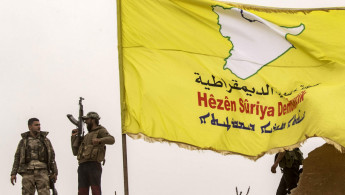Controversy brews over mysterious ownership of helicopters that crashed in Iraqi Kurdistan
One of the helicopters that crashed in the Iraqi Kurdistan region last week, killing at least nine members of the Syrian Democratic Forces (SDF), had been purchased by a group within the ruling Patriotic Union of Kurdistan (PUK), Masrour Barzani, the prime minister of the Kurdistan Regional Government (KRG), claimed on Saturday.
The SDF, which controls most of the northeast, is a crucial ally for the US-led coalition against the Islamic State group in Syria and neighbouring Iraq.
Two helicopters carrying SDF counter-terrorism units (YAT) to Sulaimaniyah, in Iraq's autonomous Kurdistan region, on Wednesday evening "crashed due to bad weather, leading to the death of nine of our fighters," the SDF said in a statement.
"We've begun an investigation to know what these helicopters are and why they were there. These were helicopters that initially were purchased by a group in PUK, but why did they end up in the SDF? We don't know," Barzani addressed several international diplomats working in the Kurdistan region.
"We are working with the Iraqi federal government and the US-led coalition to understand why the helicopters were in the air without permission and what they were doing in that area in the first place," he added.
Among the dead was SDF counter-terrorism commander Shervan Kobani - a cousin of SDF leader Mazloum Abdi.
The SDF said the delegation was on its way to Iraqi Kurdistan "to exchange security and military expertise".
Its statement did not say whether the two aircraft had collided or give any other details of the fatal accident.
Iraqi Kurdish authorities had said Thursday that five people were killed when a single helicopter came down in Dohuk, the most northerly of the provinces that make up the autonomous region.
"The helicopter was flying between Sulaimaniyah and Rojava (northeast Syria) without notifying the formal security establishments of the Kurdistan region," The Kurdistan Region Security Council (KRSC) said in a statement on Sunday.
"A party in Sulaimaniyah [PUK] has been facilitating the relationship between the Syrian Democratic Forces (SDF) and Kurdistan Workers' Party (PKK) secretly and informally and had provided them with multiple kinds of assistance," the statement noted.
The KRG is a coalition among the two main ruling and rival parties- the Kurdistan Democratic Party (KDP), and the PUK. The Movement of Change, a smaller ruling party, is also part of the KRG. Barzani is from the KDP that dominates in Erbil and Duhok provinces, while the PUK rules Sulaimaniyah and Halabja provinces.
The PUK has yet to announce its official stance on Barzani's claims, which is expected to contribute to further deteriorating relations between the two parties.
The New Arab contacted Soran Jamal Tahir, PUK's official spokesperson, but he was not immediately available to comment.
Stran Abdulla, head of PUK's media office in a statement on Sunday, a copy has been sent to TNA, denied the helicopters were owned by his party and also refuted allegations by KRSC that PUK is helping SDF and PKK.
"OIR has no official comments regarding the helicopter crash as it is outside the scope of our operations," the Combined Joint Task Force- Operation Inherent Resolve (CJTF-OIR) told TNA.
9 fighters of the SDF's anti-terrorism units were killed in a helicopter crash heading to the city of Sulaymaniyah in southern Kurdistan (northern Iraq) as part of joint efforts to fight ISIS.
— Alan Meîş (@alan_maaesh) March 17, 2023
These forces are among the most prominent units that eliminated ISIS in 9 years. pic.twitter.com/l5lQcdnLp9
Several Kurdish journalists, citing intelligence sources, have claimed that the helicopters were destroyed by the Turkish army inside the Kurdistan region as per precise reported intelligence.
Bafel Talabani, PUK's president in a statement on Friday expressed his "heartfelt" condolences to the SDP and YAT.
"The PUK is proud of the glorious history that the Counter-Terrorism Forces (CTG) struggled alongside the Rojava's counter-terrorism units to protect the Kurdistan soil, recording heroic stories," Talabani was quoted by Esta, an outlet close to the PUK.
Pictures of Talabani wearing a YAT logo on his outfit were circulating by Kurdish social media users on Friday.
Recently, tensions have escalated between the two main parties over the region's parliamentary elections, how the region's oil revenues are distributed, and the killing of a former member in the PUK's CTG in Erbil.
Hawkar Abdullah Rasoul, known as Hawkar Jaff, a former colonel in the ranks of PUK's Counter-Terrorism Group (CTG), was killed in the capital city of Erbil on 7 October after a sticky bomb attached to his vehicle detonated. The KDP accused its rival party, the PUK, of being behind the killing. PUK denies it had been involved in the assassination.
Qubad Talabani, the KRG deputy prime minister from PUK, and four other ministers have boycotted the cabinet's regular sessions since October 2022.
Leaders of both parties, however, said on multiple occasions that the two parties can resolve their issues through dialogue.
Masrour Barzani said in a statement on 6 March that they have on several occasions asked the KRG deputy PM and the PUK ministerial team to return to the cabinet's weekly meetings.
Kurdistan Region President Nechirvan Barzani early this month called the PUK ministerial team to return to KRG weekly meetings, indicating that the tensions between the two parties have "exhausted" everyone.
But he ruled out that the tensions would lead to military confrontations.





 Follow the Middle East's top stories in English at The New Arab on Google News
Follow the Middle East's top stories in English at The New Arab on Google News


